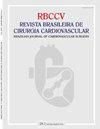Ring Fracture of Brazilian Aortic Valve Bioprostheses Using Non-Compliant High-Pressure Transcatheter Balloon, an Ex Vivo Test
IF 1.2
4区 医学
Q4 CARDIAC & CARDIOVASCULAR SYSTEMS
Revista Brasileira De Cirurgia Cardiovascular
Pub Date : 2022-05-23
DOI:10.21470/1678-9741-2021-0272
引用次数: 0
Abstract
Introduction Aortic valve bioprostheses ring fracture in valve-in-valve procedures has shown low complication rates and presents as an option in the treatment of patients at high risk for conventional surgery, avoiding high transvalvular gradients, which are associated with increased mortality. Some prostheses available in the market cannot be fractured. In an ex vivo test, the possibility of ring fracture of aortic valve bioprostheses produced in Brazil when submitted to radial force application using a high-pressure non-compliant balloon was evaluated. Methods One unit of each aortic valve bioprosthesis model, sizes 19 and 21 mm, produced by Brazilian companies (Braile Biomédica, Cardioprótese, and Labcor), was used. In the experiment, a non-compliant high-pressure balloon (Atlas®-Gold), 1 mm larger than the external diameter of the prosthesis, was positioned inside the valve annulus and inflated gradually aiming to fracture the prosthesis. Fracture pressures and photographic and radiological images of the prostheses before and after test were recorded. Results All prostheses were fractured. In the models with metal ring, the fracture pressures were between 23 and 25 atm. In the other prostheses, the rupture occurred between 10 and 13 atm. No deformations in the structure were observed, which could potentially damage the aortic root. Conclusion All the Brazilian prostheses evaluated were fractured, although the presence of a metal ring in the prosthesis framework increases the pressure required for fracture. The information obtained helps in the planning of valve-in-valve procedures in patients with aortic valve bioprostheses.使用非顺应性高压导管球囊的巴西主动脉瓣生物瓣膜环断裂的体外试验
在瓣内手术中,生物假体主动脉瓣环骨折的并发症发生率较低,可作为传统手术高风险患者的一种治疗选择,避免了与死亡率增加相关的高跨瓣梯度。市场上有些假体是不能断裂的。在一项离体试验中,对巴西生产的主动脉瓣生物假体在使用高压非柔性球囊施加径向力时发生环断裂的可能性进行了评估。方法采用巴西公司(Braile biom, Cardioprótese, Labcor)生产的19和21 mm的主动脉瓣生物假体模型各1个。在实验中,将一个大于假体外径1mm的高压球囊(Atlas®-Gold)放置在瓣膜环内并逐渐充气,目的是使假体骨折。记录测试前后假体的骨折压力、照相和放射学图像。结果所有假体均骨折。在带金属环的模型中,断裂压力在23 ~ 25 atm之间。在其他假体中,破裂发生在10到13毫米之间。未观察到可能损害主动脉根部的结构变形。结论所有巴西假体均发生骨折,尽管假体框架内金属环的存在增加了骨折所需的压力。获得的信息有助于主动脉瓣生物假体患者的瓣膜内手术计划。
本文章由计算机程序翻译,如有差异,请以英文原文为准。
求助全文
约1分钟内获得全文
求助全文
来源期刊

Revista Brasileira De Cirurgia Cardiovascular
CARDIAC & CARDIOVASCULAR SYSTEMS-SURGERY
CiteScore
2.10
自引率
0.00%
发文量
176
审稿时长
20 weeks
期刊介绍:
Brazilian Journal of Cardiovascular Surgery (BJCVS) is the official journal of the Brazilian Society of Cardiovascular Surgery (SBCCV). BJCVS is a bimonthly, peer-reviewed scientific journal, with regular circulation since 1986.
BJCVS aims to record the scientific and innovation production in cardiovascular surgery and promote study, improvement and professional updating in the specialty. It has significant impact on cardiovascular surgery practice and related areas.
 求助内容:
求助内容: 应助结果提醒方式:
应助结果提醒方式:


